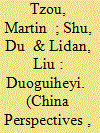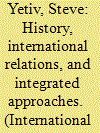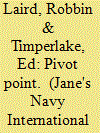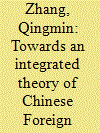|
|
|
Sort Order |
|
|
|
Items / Page
|
|
|
|
|
|
|
| Srl | Item |
| 1 |
ID:
156835


|
|
|
|
|
| Summary/Abstract |
Over the last decade, organized criminal violence has reached unprecedented levels and has caused as much violent death globally as direct armed conflict. Nonetheless, the study of organized crime in political science remains limited because these organizations and their violence are not viewed as political. Building on recent innovations in the study of armed conflict, I argue that organized criminal violence should no longer be segregated from related forms of organized violence and incorporated within the political violence literature. While criminal organizations do not seek to replace or break away from the state, they have increasingly engaged in the politics of the state through the accumulation of the means of violence itself. Like other non-state armed groups, they have developed variously collaborative and competitive relationships with the state that have produced heightened levels of violence in many contexts and allowed these organizations to gather significant political authority. I propose a simple conceptual typology for incorporating the study of these organizations into the political violence literature and suggest several areas of future inquiry that will illuminate the relationship between violence and politics more generally.
|
|
|
|
|
|
|
|
|
|
|
|
|
|
|
|
| 2 |
ID:
152163


|
|
|
|
|
| Summary/Abstract |
Chinese urban planning has recently begun an institutional revolution that seeks to integrate plans drawn up by several ministries. Aimed at giving more coherence to public action, the process of integration, already technically complex, is confronted with a power struggle between administrations, making duoguiheyi difficult to implement.
|
|
|
|
|
|
|
|
|
|
|
|
|
|
|
|
| 3 |
ID:
105231


|
|
|
|
|
| Publication |
2011.
|
| Summary/Abstract |
This essay starts by exploring how history can contribute to the discipline of international relations (IR). It then moves beyond this question to explore a broader question, beyond IR and history, with which this symposium is concerned: how can we enhance interdisciplinary analysis in international studies? With regard to the first question, this essay advances several themes. First, while history can serve IR in several ways, it is especially salient to the study of change in IR. Second, the study of history can help us connect the dots across time in ways that can complement IR. Stringing detailed cases together or examining the broader sweep of a longer time period may help us discern causal connections that would have been buried in more streamlined and short-term analyses. Third, history can aid in theory-building, modeling, and testing in the study of IR. Quantitative approaches can also benefit from in-depth historical studies. In assessing the value of history to IR, however, it is critical to ask what type of historians and IR scholars we are considering and to be aware of the differences among them. Fourth, while it is useful to draw on history for IR, history also has its limits and may be misused. At the core, this essay examines how history can contribute to IR, but that analysis raises a broader question: how can we integrate notions and insights from various disciplines in international studies, including history and IR? This essay advances one schema for doing so, which it calls "integrated approaches." It demonstrates one type of integrated approach for the study of foreign policy behavior. The approach systematically draws on multiple disciplines to explain behaviors such as decisions to make treaties, go to war, or ally with other countries.
|
|
|
|
|
|
|
|
|
|
|
|
|
|
|
|
| 4 |
ID:
172431


|
|
|
|
|
| Summary/Abstract |
Through a normative lens, this article investigates integrated ocean management and the multiple concepts that it involves. Although international law provides legal authority to coastal states to manage their ocean area entitlements, no single legally binding norm specific to integrated ocean management exists. Nevertheless, by combining different internationally recognized sources, this article identifies and discusses two normative concepts applicable in coastal state integrated ocean management. These are (1) the framing of integrated ocean management as a management process and (2) the incorporation of environmental, economic, and social concerns into an ocean management policy.
|
|
|
|
|
|
|
|
|
|
|
|
|
|
|
|
| 5 |
ID:
125642


|
|
|
|
|
| Publication |
2013.
|
| Summary/Abstract |
The strategic pivot toward the Asia-Pacific region is intended to rebalance the projection and focus of US military power in the years ahead. However, it will not be without its challenges.
|
|
|
|
|
|
|
|
|
|
|
|
|
|
|
|
| 6 |
ID:
171161


|
|
|
|
|
| Summary/Abstract |
The article provides a critical overview of the rise of resilience at the European Union (EU) level and to what extent its adoption is reshaping the terms of the EU’s peacebuilding interventions. It argues that resilience offers a four-fold contribution to promoting sustainable peace: (1) a focus on complexity; (2) a systems approach; (3) a shift toward local capacities; and (4) an emphasis on human agency. The article then applies this framework to assess the implementation of the EU’s “resilience turn” since the adoption of the EU Global Strategy in 2016. Focusing on the EU’s discourse and its peacebuilding practices in the Western Balkans, the evidence suggests that the EU has only embraced a systems/integrated approach, while neglecting deeper understandings of complexity, local capacities and human agency. As a result, the contribution of resilience to EU peacebuilding remains limited.
|
|
|
|
|
|
|
|
|
|
|
|
|
|
|
|
| 7 |
ID:
133815


|
|
|
|
|
| Publication |
2014.
|
| Summary/Abstract |
This article tries to integrate the theories of personality type and Chinese foreign policy studies. It finds that theories of personality offer a new perspective on the study of Chinese foreign policy and help to better explain the differences in China's foreign policy under Mao Zedong and Deng Xiaoping, including their international orientation, the main themes of China's foreign policy during their respective times in office, their policies towards the major powers, as well as those towards small countries. Theoretically, such integration contributes to the development of a more general theory of foreign policy analysis that would travel better beyond the borders of the American case. Empirically it highlights the necessity and benefit of an integrated approach bringing leadership personality back into the center of the analysis while taking into account other levels of analysis in the study of Chinese foreign policy.
|
|
|
|
|
|
|
|
|
|
|
|
|
|
|
|
|
|
|
|
|